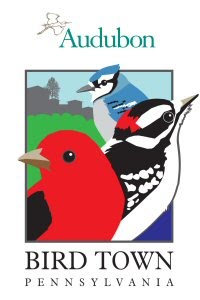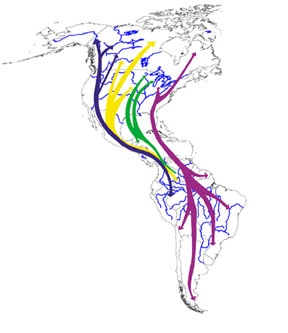Welcome to...Audubon Bird Town Pennsylvania (PA) of Lower Frederick Township
Bird Town is a working partnership of Audubon and municipalities in Pennsylvania (PA) to promote conservation and community-based actions to create a healthy, more sustainable environment for birds and people.
Audubon provides the tools for each municipality to engage their residents, schools, and business in making more ecologically friendly decisions, conserving energy, and in the process, saving money. A Bird Town makes efforts to restore valuable eco-system services to create a culture of conservation where everyone is a potential steward of nature in their back yard and beyond.
What are the benefits to becoming a Bird Town?
- An improved quality of ecological systems
- Community pride and increased marketability
- Vastly increased resources to native birds and native insects
- A safer, more rewarding place to live, work, and play
- Economic development of higher property values
- Maintenance costs and times reduced
- Cleaner water, cleaner air, less landfill
- Cooperation of community officials, constituents, and businesses
- Encourages exercise, recreation and community pride and cohesion
- Renewed ecosystem services (such as storm-water management)
How does my municipality become a Bird Town?
The following is required to become a Bird Town:
- A completed Bird Town application
- The municipalities agree to work with Audubon to immediately promote their Bird Town status by:
- Publishing 'The Welcome to Bird Town" article in next available news letter
- Creating a Bird Town web-page on your municipal website.
- Posting of at least five street signs (provided) and one banner (fee options below)
- Providing Audubon with local press contacts to promote Bird Town backyard workshop dates
- Making outreach materials available to the public
- Assign a "captain" or a point-person to act as liaison between the "town" and Audubon and coordinate promotional opportunities & related events.
- Presence at and promotion of a Bird Town festival. This may be a regional festival, a stand-alone municipal, or as part of an existing ecofest or community day.
How can homeowners, schools and businesses help their Bird Town?
The power of Bird Town comes from individuals taking actions on their landscape and in their home to be greener, experience nature every day, and contribute the township’s overall efforts to minimize environmental impacts. For example, by planting native plants and registering your property with Audubon, valuable data will be added to the township scorecard that will continue to improve each year. Contribute to citizen science and you and your family become key players in the world of bird conservation!
What Does Audubon Provide to a Bird Town?
- Brochures and educational materials provided for your constituents
- Articles for your newsletters and website, content for CATV
- Promotional materials for the Great Backyard Bird Count and other citizen science programs
- Backyard Ecology workshops open to the residents of Bird Towns
- Street signs for the township’s gateways proudly proclaiming your town cares about birds and the environment
- Annual analysis and reports based on collected data
- Access to experts and resources for consultations or presentatio




